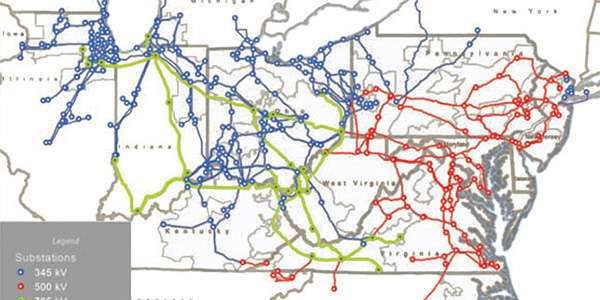By Christen Smith
PJM says it won’t take sides in a debate between transmission owners and load interests over the TOs’ proposal for removing substations and other “critical” assets from NERC’s CIP-014-2 list.
NERC’s critical infrastructure protection standard CIP-014-2 requires TOs to identify and protect transmission stations and substations whose loss or sabotage could result in widespread instability, uncontrolled separation or cascading outages. The TOs last month proposed Tariff Attachment M-4, which outlines a process for vetting transmission projects to remove the assets from the list.
Some stakeholders contend PJM rules require that addressing the CIP-014-2 assets must involve an open and transparent discussion with stakeholders. But doing so, the TOs contend, could reveal the highly secretive location of these facilities.
The RTO said it will stay on the sidelines of the transparency debate and encouraged stakeholders to work out the Tariff language among themselves.
“PJM is prepared to assume the role of an independent, third party to assess whether a transmission project will effectively address the critical infrastructure and associated operations and reliability risks giving rise to the CIP-014 designation in the first place,” PJM spokesperson Susan Buehler said in an email to RTO Insider. “By so doing, PJM can ensure that projects meet the shared objective to reduce critical facilities outright. Because this is a PJM transmission owner proposal, we encourage dialogue between the transmission owners and other stakeholders.”
Consumer Advocates of the PJM States questioned why the draft attachment wasn’t scheduled for discussion at the August meeting of the Markets and Reliability Committee or the Planning Committee. (See PJM TO Tariff Filing Stirs up Transparency Concerns.)
Last week, the D.C. Office of the People’s Council presented a problem statement and issue charge that would require all sectors come together to manage future CIP-014 projects. (See “Consumer Advocates: CIP-014 Projects Need More Transparency,” PJM PC/TEAC Briefs: Sept. 12, 2019.)
American Municipal Power took the debate a step further on Tuesday when the company publicized its “profound” concerns about the TOs’ proposal in a letter to PJM’s planning department and Board of Managers. Of particular concern, AMP said, was the TOs’ attempt to classify CIP-014-2 projects as supplemental, which it said could hide large-scale upgrades with regional and interregional impacts behind a veil of secrecy.
“Given the importance of these substations to regional and possibly interregional operations, there can be little question that the planning of those substations would be conducted through the PJM-administered Regional Transmission Planning Process,” AMP CEO Marc Gerken wrote.
PJM said NERC assigned TOs the role of managing physical security for CIP-014-2 facilities. Ken Seiler, vice president of planning, told the Planning Committee last week that staff support the idea of reducing or eliminating the number of CIP-014-2 assets in the RTO’s territory, but he would not comment on the transparency concerns raised by the consumer advocates. There are less than 20 “critical” assets within the footprint.
“The elephant is in the room, so it’s not like we are ignoring it,” he said. “PJM conceptually supports the idea of electrically making critical facilities noncritical. We think that’s the best thing for this system.”
Pulin Shah, director of transmission strategy and contracts for Exelon, said TOs “will follow the process laid out in the Consolidated Transmission Owners Agreement and the Tariff” when collecting and responding to stakeholders’ comments on Attachment M-4. Exelon has led the PC and MRC discussions on the attachment thus far, though it was just one of several members of the Transmission Owners Agreement-Administrative Committee that helped develop the proposal, Shah said.
“We have extended the comment period to ensure we allow ample time for stakeholders to provide their comments and questions, as the transmission owners determine next steps,” he said. “We will review and respond accordingly to relevant comments and questions through this process, as opposed to having one-off discussions that could lead to confusing the issue.”



